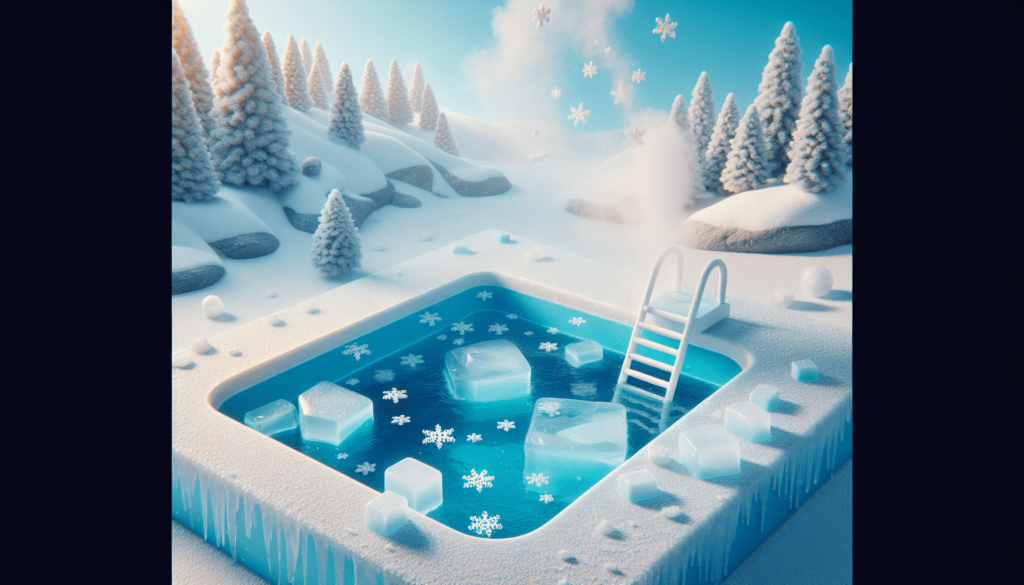Are you curious about the benefits of cold plunges and whether they are actually good for you? Cold plunges, the practice of immersing your body in icy water, have gained significant popularity recently. But do they live up to the hype? In this article, we will explore the potential advantages of cold plunges and delve into the science behind them. So, grab your warm beverage and get ready to find out if these chilly baths are worth the plunge!

Benefits of Cold Plunges
Increased Circulation
One of the key benefits of cold plunges is the significant increase in circulation throughout your body. When you expose yourself to cold water, your blood vessels contract, forcing the blood to circulate at a faster rate. This increased circulation helps to deliver oxygen and nutrients to your muscles, organs, and tissues more efficiently, promoting overall health and vitality.
Reduction in Inflammation
Cold plunges can also provide noticeable relief from inflammation. When you expose your body to cold water, it triggers a response from your immune system to reduce inflammation in the affected area. This can be particularly beneficial for individuals suffering from conditions such as arthritis or muscle injuries. By regularly engaging in cold plunges, you can potentially alleviate pain and discomfort associated with inflammation.
Boosted Immune System
Regular cold plunges have been shown to enhance the functioning of your immune system. The exposure to cold water stimulates the production of white blood cells, which are crucial for fighting off infections and diseases. Additionally, the increase in circulation that accompanies cold plunges helps to flush out toxins from your body, further supporting a strong immune system. By incorporating cold plunges into your routine, you may find yourself falling ill less frequently and recovering more quickly from illnesses.
Improved Mental Well-being
Cold plunges not only benefit your physical health but also have a positive impact on your mental well-being. When you immerse yourself in cold water, it triggers the release of endorphins, which are the chemicals responsible for feelings of happiness and relaxation. Many individuals report a significant reduction in stress, anxiety, and even symptoms of depression after regularly engaging in cold plunges. Moreover, cold exposure has been linked to improved cognitive function and focus, making it an excellent practice for mental clarity.
Physical Benefits
Enhanced Recovery
Athletes and individuals engaged in intense physical activities can greatly benefit from cold plunges as they aid in enhanced recovery. The cold water helps to constrict blood vessels, reducing swelling and inflammation in muscles. This, in turn, speeds up the recovery process and alleviates muscle soreness. By incorporating cold plunges into your post-workout routine, you can promote faster recovery and get back to your activities feeling refreshed and rejuvenated.
Relief from Muscle Soreness
If you often experience muscle soreness after a challenging workout or physical exertion, cold plunges can provide much-needed relief. The cold water helps to numb the area, temporarily dulling the sensation of pain. Additionally, the increased circulation triggered by cold plunges helps to flush out the lactic acid buildup in your muscles, which is often the cause of soreness. By incorporating cold plunges into your routine, you can significantly reduce muscle soreness and recover more quickly for your next endeavor.
Increased Metabolism
Another physical benefit of cold plunges is an increased metabolism. When your body is exposed to cold water, it works harder to maintain its core temperature, resulting in a temporary boost in metabolic rate. This can lead to more efficient calorie burning and potentially aid in weight loss or weight management. Additionally, the increased circulation from cold plunges stimulates the digestive system, promoting better nutrient absorption and overall digestion.
Skin Health
Improved Skin Appearance
Cold plunges can do wonders for your skin health and appearance. The cold water helps to constrict blood vessels, reducing redness and inflammation in the skin. This can result in a more even complexion and reduced appearance of blemishes or acne. Additionally, the increased circulation from cold plunges brings more nutrients and oxygen to the skin, promoting a healthy glow and improved overall skin appearance.
Reduced Skin Inflammation
For individuals with skin conditions such as eczema or psoriasis, cold plunges can offer relief from inflammation and itching. The cold water helps to soothe irritated skin, reducing redness and swelling. Regular cold plunges can significantly alleviate symptoms and improve the overall condition of your skin.
Tightened Pores
If you struggle with enlarged pores or oily skin, cold plunges can help tighten and minimize the appearance of your pores. The cold water causes the pores to constrict, reducing their size and preventing excess oil production. By regularly incorporating cold plunges into your skincare routine, you can achieve a smoother and more refined complexion.
Mental Health Benefits
Stress Reduction
In today’s fast-paced and stressful world, finding effective ways to reduce stress is essential. Cold plunges can be a valuable addition to your stress management toolkit. The exposure to cold water helps to activate your body’s natural stress response, which in turn promotes relaxation and reduces stress levels. Many individuals find the invigorating sensation of a cold plunge to be incredibly calming and rejuvenating, making it an excellent practice for stress relief.
Enhanced Mood
The release of endorphins triggered by cold plunges not only impacts your mental well-being but also enhances your mood. Endorphins are known as “feel-good” chemicals, and their release during a cold plunge can leave you feeling uplifted, energized, and content. By regularly engaging in cold plunges, you may find yourself experiencing increased positivity and improved overall mood.
Improved Focus
If you often find it challenging to stay focused or maintain mental clarity, cold plunges may be worth considering. The exposure to cold water stimulates your body’s natural alertness response, effectively enhancing your cognitive function and focus. Many individuals report increased mental sharpness and improved productivity after engaging in a cold plunge. By incorporating cold plunges into your routine, you can potentially boost your ability to concentrate and perform tasks more efficiently.

Potential Risks
Hypothermia and Frostbite Risk
While cold plunges offer numerous benefits, it’s important to be aware of the potential risks involved. Prolonged exposure to extremely cold water can increase the risk of hypothermia and frostbite. It is crucial to monitor the duration and temperature of your cold plunges to avoid these risks. If you start shivering uncontrollably or experience numbness, tingling, or discolored skin, it’s essential to warm yourself up immediately and seek medical attention if necessary.
Cardiovascular Strain
Individuals with pre-existing cardiovascular conditions should exercise caution when it comes to cold plunges. The sudden exposure to cold water can cause blood vessels to constrict quickly, putting additional strain on the heart and potentially leading to an increased risk of cardiac events. If you have a history of heart conditions or high blood pressure, it is advisable to consult with your healthcare provider before incorporating cold plunges into your routine.
Breathing Problems
Some individuals may experience breathing difficulties during or after a cold plunge. The shock of the cold water can cause a reflexive gasp or breath-holding response, which can potentially lead to shortness of breath or even the inhalation of water. It is essential to be mindful of your breathing and take slow, controlled breaths while in the cold water. If you have any respiratory conditions or concerns, it is advisable to consult with your healthcare provider before attempting cold plunges.
Precautions for Cold Plunges
Gradual Exposure
To minimize the risks associated with cold plunges, it is crucial to ease into the practice gradually. Start with shorter exposure times and gradually increase the duration as your body becomes acclimated. This gradual approach allows your body to adjust to the cold water and reduces the risk of hypothermia or other adverse reactions.
Avoiding Alcohol and Caffeine
Consuming alcohol or caffeine before a cold plunge can have adverse effects on your body’s ability to regulate its temperature and respond to the cold water. These substances can impact your blood circulation and increase the risk of hypothermia. It is best to avoid alcohol and caffeine before engaging in a cold plunge to ensure your body can adapt to the cold water effectively.
Proper Supervision
If you are new to cold plunges or have any pre-existing health conditions, it is advisable to have proper supervision when engaging in this practice. Having someone nearby who can assist if any complications arise can provide peace of mind and ensure your safety. Additionally, they can offer guidance on exposure times and temperature to help you get the most out of your cold plunges while minimizing risks.
Alternatives to Cold Plunges
Cold Showers
If the idea of immersing yourself completely in cold water is too intense, you can still reap some of the benefits by taking cold showers. Gradually reduce the temperature of your shower to cold or slightly below average to experience the refreshing effects on your circulation, muscle recovery, and mental well-being.
Cryotherapy Treatments
For those who prefer a more controlled and professional approach, cryotherapy treatments are another alternative to cold plunges. Cryotherapy involves exposing the body to extremely cold temperatures in a specialized chamber or machine. These treatments offer similar benefits to cold plunges, such as reduced inflammation, improved recovery, and enhanced mood. However, it is crucial to research and consult with a qualified professional before undergoing cryotherapy treatments.
In conclusion, cold plunges can offer a wide range of benefits for both your physical and mental health. From increased circulation and reduced inflammation to improved skin health and stress reduction, incorporating cold plunges into your routine can be a valuable addition to your wellness practices. However, it’s crucial to be aware of the potential risks and take necessary precautions, such as gradual exposure, avoiding alcohol and caffeine, and seeking proper supervision. If you prefer milder alternatives, cold showers or cryotherapy treatments can still provide many of the benefits associated with cold plunges. With proper care and consideration, you can harness the power of cold water for your overall well-being.

